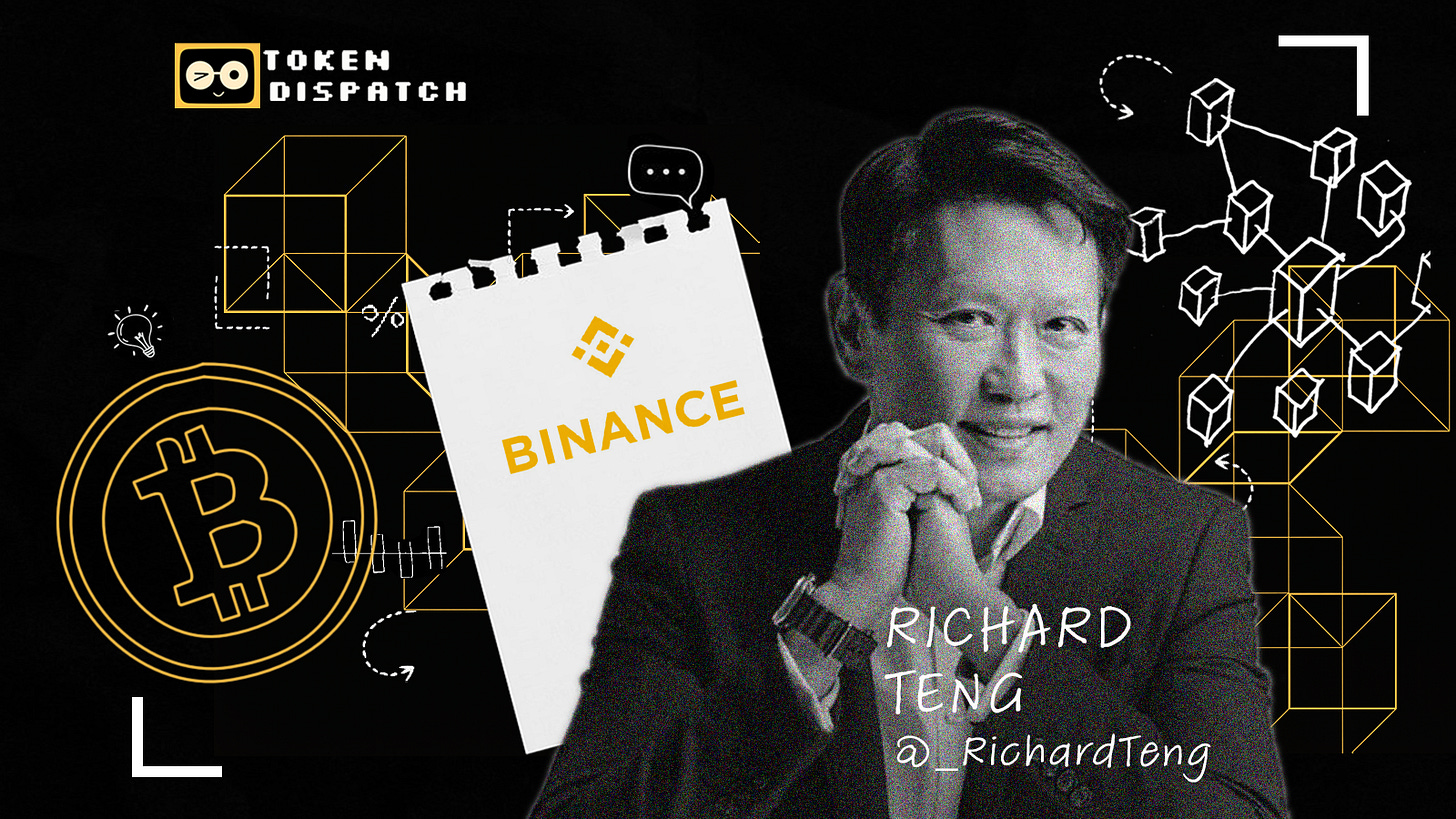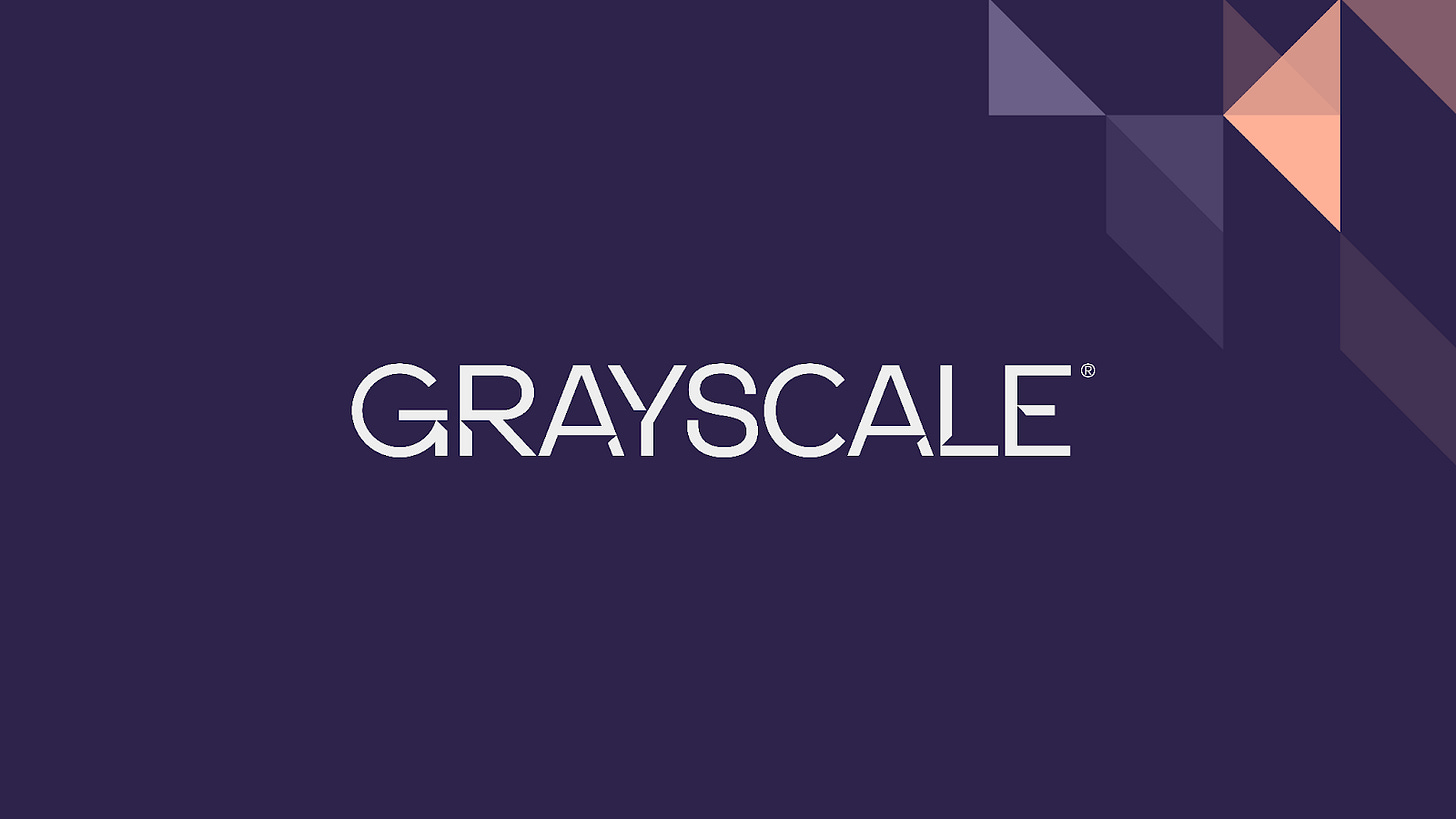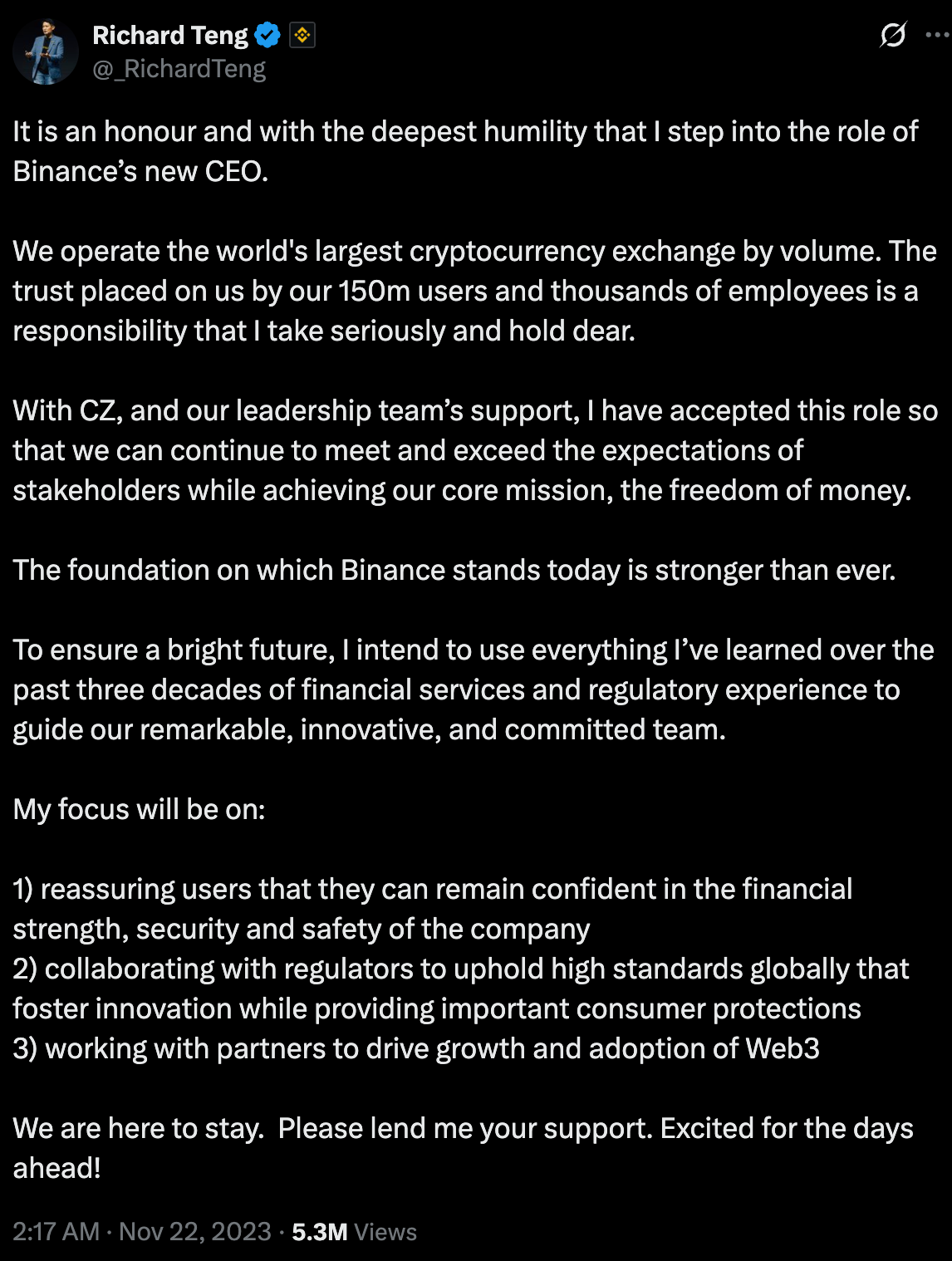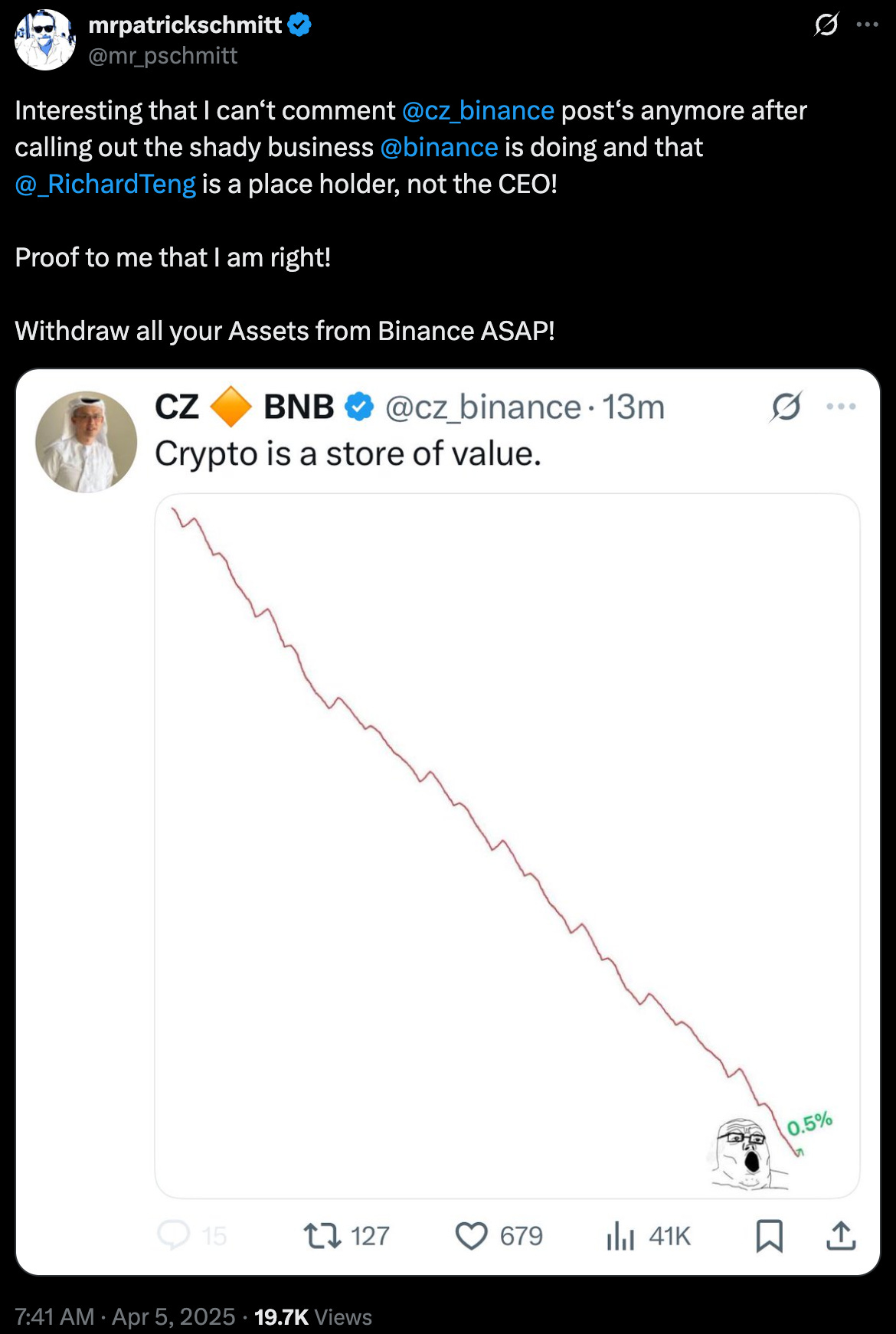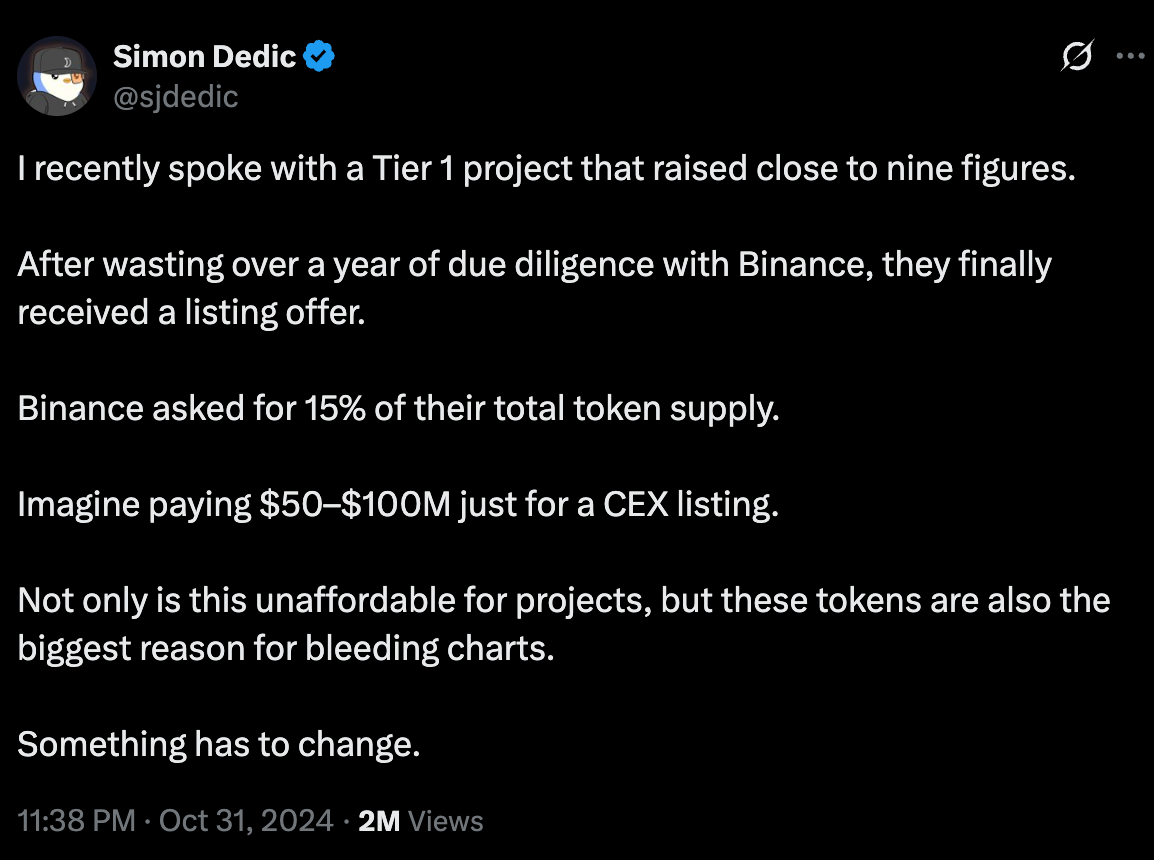Richard Teng: Steering Through The Darkest Hour 🤺
"We are privileged and blessed in that sense and I think the more they are educated, the more they embrace this space."
The notification lit up crypto Twitter.
CZ removed "ex-@binance" from his profile.
Prediction markets are pricing in a presidential pardon. My X timeline is buzzing with theories about the founder's imminent return. Everyone has an opinion about whether Changpeng Zhao would reclaim his throne at the world's largest crypto exchange.
But while the internet is obsessed over CZ's digital breadcrumbs, there was a man quietly running Binance, steering the company through the most dangerous period in its history.
We noticed it. Now it’s time to tell his story.
Richard Teng has quietly transformed Binance from a compliance nightmare into one of the most regulated crypto exchange. He took over during the company's darkest hour, facing $4.3 billion in fines, regulatory fury, and existential questions about its survival.
Eighteen months later, Binance boasts more users, more licenses, and more institutional partnerships than ever before.
The 52-year-old former regulator insists he's focused on the future, not the past. But his position is more precarious than it appears. The choices he's made to legitimise Binance may have come at the cost of what made it revolutionary in the first place.
Crypto Investing Without the Crypto Chaos
Forget seed phrases, exchange hacks, and late-night wallet setups.
With Grayscale, you can invest in Bitcoin, Ethereum, and other digital assets the same way you’d buy a stock — through regulated, SEC-reporting products.
No private keys to manage
No unregulated exchanges
No steep learning curve
It’s the easiest way for individuals and institutions alike.
Richard Teng's journey into crypto began in the most establishment place possible: a Singapore government office. After graduating with first-class honors in accounting from Nanyang Technological University in 1994, he spent 13 years as a regulator at the Monetary Authority of Singapore (MAS).
Teng comes from humble beginnings. His mother worked at an assisted living facility, and details about his father are notably absent from public records. The government job offered security and prestige that his family background hadn't provided.
At MAS, Teng learned the machinery of financial regulation. He helped shape Singapore's transformation into a global financial hub, writing the rules that banks had to follow. He investigated firms that broke them. Teng believed that smart rules could enable innovation rather than stifle it.
His big break came in 2015, when he moved to Abu Dhabi to run the Financial Services Regulatory Authority at Abu Dhabi Global Market (ADGM). It was there, in 2017, that he encountered cryptocurrency and made a decision that would define his career. Instead of banning digital assets, he would try to regulate them properly.
ADGM became one of the first financial centres to create comprehensive crypto rules. The framework attracted dozens of crypto companies and established Teng's reputation as a progressive regulator. But it also marked his transition from rule-maker to rule-breaker. By 2021, Teng had crossed the line, joining Binance as CEO of its Singapore operations.
Here was a man who had spent decades enforcing financial regulations, now working for an exchange that seemed to ignore them entirely.
When CZ tapped Teng to lead Binance Singapore in 2021, it looked like a strategic hire. The exchange was facing regulatory pressure globally, and Teng's credentials could help smooth things over with authorities. But Teng's rise within Binance was faster than anyone expected. Within two years, he had gone from running a single country operation to overseeing regional markets across Asia, Europe, and the Middle East. By late 2023, he was widely viewed as CZ's likely successor.
Still, few expected the transition to happen so abruptly. On November 21, 2023, CZ announced his resignation as part of a plea deal with U.S. authorities. Teng was named CEO immediately, inheriting a company in crisis.
Binance faced the largest financial penalty in Treasury Department history. Regulators in multiple countries were investigating or banning the exchange. Users were withdrawing funds, worried about the platform's stability.
Teng had to act fast.
The Compliance Revolution (Or Capitulation?)
Teng's first priority was obvious: fix Binance's relationship with regulators.
Under CZ, the exchange operated with minimal oversight, often treating compliance as an afterthought. Teng flipped that script entirely.
He hired hundreds of compliance officers, established the company's first formal board of directors and invested "hundreds of millions of dollars" in risk management systems. He began working with regulators, rather than fighting them.
Read: Binance CEO Invests in Compliance to Move on From Past Mistakes - WSJ
The results have been impressive. Binance now holds regulatory licenses in 21 jurisdictions—more than any other crypto exchange. Major institutions that once avoided the platform are now eager to partner with it.
However, critics argue that Teng has overcorrected. In his zeal to appease regulators, they claim, he has stripped away much of what made Binance innovative and competitive.
The exchange now takes months to list new tokens, compared to the rapid-fire launches of the CZ era. Its compliance processes are so stringent that some projects choose to launch on other platforms instead. The startup that once moved fast and broke things now moves slowly and follows rules.
Teng disputes this characterisation, arguing that compliance is necessary for mainstream adoption.
His words:
“We paid a heavy price for it and we hope that other players in this space will learn from our lesson,” …“The whole industry can do much better working together to keep out the bad actors.”
Perhaps Teng's biggest challenge isn't regulatory pressure or user complaints. It's the ghost of his predecessor. CZ remains Binance's largest shareholder and could theoretically return to an operational role if his legal issues are resolved.
This creates an awkward dynamic. Teng is technically the CEO, but everyone knows he serves at the pleasure of someone who isn't even officially involved in the company anymore. Major strategic decisions still require CZ's blessing, even if he's not supposed to be making them.
The situation became more complicated in early 2025 when CZ removed references to being Binance's "ex-CEO" from his social media profiles. Teng insists he's not worried about being replaced. But his position is inherently unstable. If CZ does return, what role would there be for the man who kept the lights on during his absence?
Despite the corporate intrigue, Teng has carved out his own identity as CEO. His signature issue is financial inclusion — using crypto to serve the billions of people excluded from traditional banking.
He frequently cites remittances as crypto's "killer app." Traditional money transfer services charge fees of 10% or more to send money across borders. With crypto, those transfers can happen instantly for almost nothing.
"In the last few years, especially where many countries have gone through hyperinflationary scenarios, by holding stablecoins, they are so much better off," Teng explains.
Binance Pay, the exchange's payment service, has processed over $230 billion across more than 300 million transactions as of mid 2025. Teng estimates it has saved users more than $1.75 billion compared to traditional remittance services.
The focus on practical utility rather than speculative trading represents a shift from the CZ era. While his predecessor courted day traders and yield farmers, Teng is targeting the global poor and unbanked. It's a noble mission, but it also raises questions about priorities. Should the world's largest crypto exchange focus on serving sophisticated traders who generate most of its revenue, or on providing basic financial services to people who may never trade at all?
Teng's biggest bet has been on institutional adoption. Under his leadership, Binance has aggressively courted hedge funds, family offices, and traditional financial institutions.
But this institutional focus comes with trade-offs. Professional investors expect the same level of service and protection they get from traditional financial institutions. They want segregated custody, insurance coverage, and regulatory compliance. All of these are expensive and complex to provide.
Teng argues that institutional adoption will benefit everyone by bringing legitimacy and stability to crypto markets. But the jury is still out on whether that trade-off is worth it.
Running the world's largest crypto exchange means being the world's biggest target for hackers. In January 2025, rival exchange Bybit lost $1.5 billion to sophisticated attackers, which was a stark reminder of the risks facing crypto platforms.
Teng has made security a cornerstone of his leadership, investing "hundreds of millions of dollars" in defensive systems. Binance maintains a $1 billion insurance fund and publishes regular "proof of reserve" reports.
But some security experts question whether these measures are sufficient. The insurance fund, while large, would only cover a fraction of Binance's user deposits. The proof of reserve reports, while transparent, don't prevent inside jobs or sophisticated attacks.
The Meme Coin Dilemma
One area where Teng has struggled to find balance is token listings. Binance's decisions about which tokens to support can make projects worth billions overnight, creating huge pressure on the exchange.
The situation worsened with the explosion of meme coins and speculative tokens. Millions of new tokens launch every month, most with no real use or long-term future. Users want access to the latest trends, but regulators want consumer protection.
Teng has tried to handle this through community voting and stricter research. But the approach has created new problems. The listing process has become so lengthy and expensive that even legitimate projects are struggling to get on the platform.
Some industry observers point to cases where major projects with significant funding have spent over a year in Binance's due diligence process, only to receive listing offers that require giving up substantial portions of their token supply. These equity-like demands can cost projects tens of millions of dollars just for exchange access.
But Teng's team argues that the strict requirements are necessary to protect users from projects that might dump tokens and disappear. The tension reflects a deeper challenge: how do you balance protecting retail investors from scams while still giving legitimate projects reasonable access to markets?
The Road Ahead (And Behind)
As Teng approaches his second year as CEO, his report card is mixed. He has undoubtedly stabilised Binance and restored its relationship with regulators. User growth continues, and the exchange maintains its dominant market position.
The crypto industry values bold leadership and risk-taking qualities that regulatory compliance tends to discourage. Teng's cautious approach may work for now, but it may not be sustainable in a fast-moving industry.
The CZ factor adds another layer of uncertainty. If the founder does return, would Teng stay on in a subordinate role? Would he be pushed out entirely? Or would he finally get the chance to build his own legacy without living in someone else's shadow?
Teng faces a critical question about Binance's identity. Is it a crypto-native platform that happens to follow regulations, or is it a traditional financial institution that happens to trade digital assets?
His answer to that question will determine not just his own fate, but the future of the world's most important crypto exchange.
That’s it about Richard Teng. See you next week with another profile.
Until then … stay curious,
Thejaswini
Token Dispatch is a daily crypto newsletter handpicked and crafted with love by human bots. If you want to reach out to 200,000+ subscriber community of the Token Dispatch, you can explore the partnership opportunities with us 🙌
📩 Fill out this form to submit your details and book a meeting with us directly.
Disclaimer: This newsletter contains analysis and opinions of the author. Content is for informational purposes only, not financial advice. Trading crypto involves substantial risk - your capital is at risk. Do your own research.



